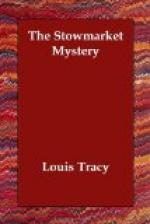“I saw him in the station at London. He followed me. I puzzled him, I suppose. He perceived the likeness between me and my dear cousins. We are like one another, are we not, we Hume-Frazers?”
He laughed mirthlessly, and stared at David and Robert alternately. Winter broke in with a hasty question:
“If he is speaking the truth about the snake poison, shouldn’t we send for a doctor?”
No one had thought of this previously. Brett reproached himself for his forgetfulness. So strange are our civilised notions that we strive to save a man’s life in order to hang him by due process at law.
It was Ooma who answered.
“Doctor!” he cried. “Bring him! Bring the whole College of Surgeons. They can watch me die, and tell you learnedly why the blood curdles and the heart refuses to act, but not all their science can beat the venom of the little karait. It is an Indian snake, more deadly than the cobra, with mightier tooth than the tiger. I meant to use that syringe on the whole cursed brood of Frazers in this country. No one would have known what happened to them. But look you, Fate is too powerful. The karait stored his poison for me only. I killed only one of the race, and him I stabbed with a Ko-Katana of my own house.”
Holden left the room to send a messenger post-haste for the village doctor.
“About Capella?” persisted Brett.
“Ah, Capella. He sought his own death. He looked at me so oddly that I thought him a spy. I was alone in a carriage when, half-way here, he ran along the platform at a small station and joined me. He began to question me. I looked out of the window and saw that we were coming to a viaduct over a stream between deep cliffs, so I took the little man and cracked his neck. Then I flung him over the bridge. It was a mistake. He should have left me alone.”
He described this cold-blooded murder of the unfortunate Italian with the weary air of one who recites a tedious episode. The lids drooped heavily over his eyes.
“I am tired,” he said. “That was a good little snake. He knew his business. He could make the best of poison.”
“Surely,” said the barrister solemnly, “you are not so utterly inhuman that at the very point of death you still maintain the attitude of a disappointed avenger. What wrong had all these people done you to demand your murderous hate?”
Ooma seemed for a moment to rouse himself from lethargy. Once again the black eyes sparkled with their menacing gleam.
“It is you,” he cried, “you, the thinker, who question me. I never gave a thought to you, or I would not now be slowly sinking into death. I might have guessed that a higher intelligence was at work than that which saw the Ko-Katana with its motto, and yet failed to read its story. You ask my motives. Can a man explain heredity? Here”—and he threw a packet of papers on the writing-desk—“are the proofs




